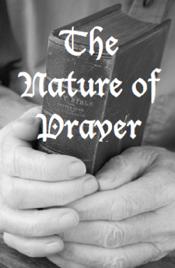
Psalm 63:1-11
The Bible Teaching Commentary
Six Aspects to Godly Prayer
Paul J. Bucknell
Psalm 63: Prayer is the breath of our relationship of God. The absence of prayer shows that we are spiritually dead. I don’t mean just saying prayers that are not spawned from the heart, of course. Jesus said empty prayers amounted to only religious ceremony. One can dress up a dead body but there sure is a difference between that corpse and a living person even if he is sick.
What do you think of when prayer is mentioned? This is a good question. Your answers reveal a lot about your relationship with God.
Throughout Psalm 63 we will be able to make observations of this man’s prayer. I would suggest that David’s prayer life is an example of not just an okay or typical prayer life but a model from which we can learn. So stay with me. My hope and prayer is that you will not only begin to ‘breathe’ more on a regular basis but because of your spiritual life, have strength to run the race that God has set before you.
__________________________________________________________
Introduction Psalm 63:1-11
1) Sincere prayers (Psalm 63:1a).
2) Powerful prayers (Psalm 63:1b).
3) Great prayers (Psalm 63:2).
4) Affectionate prayers (Psalm 63:3-5).
5) Uplifting prayers (Psalm 63:6-8).
6) Faith prayers (Psalm 63:9-11).
Study Questions on Psalm 63
__________________________________________________________
Psalm 63:1-11 NASB
1 (A Psalm of David, when he was in the wilderness of Judah.) O God, Thou art my God; I shall seek Thee earnestly; My soul thirsts for Thee, my flesh yearns for Thee, In a dry and weary land where there is no water.
2 Thus I have beheld Thee in the sanctuary, To see Thy power and Thy glory.
3 Because Thy lovingkindness is better than life, My lips will praise Thee.
4 So I will bless Thee as long as I live; I will lift up my hands in Thy name.
5 My soul is satisfied as with marrow and fatness, And my mouth offers praises with joyful lips.
6 When I remember Thee on my bed, I meditate on Thee in the night watches,
7 For Thou hast been my help, And in the shadow of Thy wings I sing for joy.
8 My soul clings to Thee; Thy right hand upholds me.
9 But those who seek my life, to destroy it, Will go into the depths of the earth.
10 They will be delivered over to the power of the sword; They will be a prey for foxes.
11 But the king will rejoice in God; Everyone who swears by Him will glory, For the mouths of those who speak lies will be stopped.1) Sincere prayers often derive from desperate circumstances
Psalm 63:1a
A Psalm of David, when he was in the wilderness of Judah.
This might sound funny to some, because the only time some people pray is when they are desperate. You know what I mean, I am sure. The jet goes through a storm; find possible indications for cancer; big exam tomorrow; fear a boyfriend is going to breakup. The list can go on and on. I don’t think many of those people first ask if it is okay to pray. They probably should. But they just pray. Desperate prayers make a lot of sense to those in need. They are looking for any extra help they can get. Isn’t that what ‘desperate’ means? You try anything.
David was in desperate straits when he wrote this Psalm. He was not at home nor in the army quarters. He wasn’t even entertaining the king as he had in past years. He prayed this in the wilderness. We have strong evidence that he was not sun tanning or on a hunting expedition there. He was there because the King Saul over the nation of Israel at that time was extremely jealous of him. He was a better general. He managed to marry his daughter. But perhaps what drove Saul crazy with jealousy was the popular saying,
"Is this not David, of whom they sing in the dances, saying, 'Saul has slain his thousands, and David his ten thousands'?" 1 Samuel 29:5
Saul was a mighty warrior. But he did what no one is supposed to. He compared himself with another. This is the shortcut to an unhappy life. Compare yourself with another. Saul should have been content with his own giftedness and be thankful for such a faithful general. But this is just the setting of the desperate situation.
There was also an inner struggle. God has promised David the throne, but he had to wait-. For what? He supposedly had to wait for Saul to die. God never gave him a time schedule but only a promise. David didn’t know why he had to wait or how long he had to wait. And now, to make everything worse, King Saul was hunting David down to kill him. David was faithful but this is the way events turned out for him. Totally unpredictable. This is the scene of David’s special prayer that was recorded for us and labeled Psalm 63. Our conclusion is that we can pray when we are desperate.
David with all his military prowess and leadership qualities was squandered away on some isolated and insignificant barren land. The famous became unknown overnight. David couldn’t do anything but try to survive, but David could pray. God enjoyed his prayers. As we go on we
will find that David’s prayers made a tremendous difference not only in his inner person but in what was happening or would happen in the strategic years ahead.
Every trial is always a training ground. And if prayer does not come out of it, it is because we doubt God has good purposes through it. Doubt kills prayer; faith causes the greatest prayers to arise. We all will go through desperate times. The question is whether your relationship with God is strong enough to trust Him at times to find His wonderful comfort and protection.
We will conclude this point by stating that it is not best if a person only prays when he is in distress, but if that is the only time one prays, it is better that you pray then. But learn to pray and depend upon the eternal God almighty. For if we are to please God, we need faith. There is no time like the present to build our trust in God.
Continue on: 2) Powerful prayers openly reveal their dependence upon God (Psalm 63:1b). Study Questions
1) Sincere prayers often derive from desperate circumstances (Psalm 63:1a).
2) Powerful prayers openly reveal their dependence upon God (Psalm 63:1b).
3) Great prayers always result from an encounter with God (Psalm 63:2).
4) Affectionate prayers respond to God’s love with adoration (Psalm 63:3-5).
5) Uplifting prayers reflect on God’s past marvelous works (Psalm 63:6-8).
6) Faith prayers enable one to face difficult situations with courage (Psalm 63:9-11).
Study Questions on Psalm 63
Most of BFF articles are nicely formatted for printing or handouts including Psalm 63. Check out the great number of articles on the BFF Library all for one great low price including shipping and handling. Read here for testimonies.








